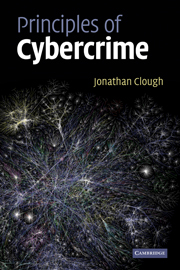Book contents
- Frontmatter
- Contents
- Preface
- Acknowledgements
- List of abbreviations
- Table of cases
- Table of legislation
- PART I Introduction
- PART II Computer as target
- 2 Computer as target
- 3 Access offences
- 4 Impairment of data
- 5 Misuse of devices
- 6 Interception of data
- PART III Fraud and related offences
- PART IV Content-related offences
- PART V Offences against the person
- PART VI Jurisdiction
- Bibliography
- Index
2 - Computer as target
Published online by Cambridge University Press: 05 June 2012
- Frontmatter
- Contents
- Preface
- Acknowledgements
- List of abbreviations
- Table of cases
- Table of legislation
- PART I Introduction
- PART II Computer as target
- 2 Computer as target
- 3 Access offences
- 4 Impairment of data
- 5 Misuse of devices
- 6 Interception of data
- PART III Fraud and related offences
- PART IV Content-related offences
- PART V Offences against the person
- PART VI Jurisdiction
- Bibliography
- Index
Summary
Introduction
We turn now to consider the first distinct category of cybercrimes: those offences where a computer is itself the target. Such offences are colloquially referred to as ‘hacking’, and cover a broad range of conduct arising from an equally broad range of motivations. Given the ubiquitous presence of computers in modern life, and the dependency of modern commerce on computer networks, such offences have potentially serious consequences.
We are not here concerned with those offences where a computer is physically taken or damaged. Although some surveys include offences such as theft of a computer within the definition of cybercrime, such conduct falls comfortably within the scope of existing property offences. Rather, our focus is on ‘[o]ffences against the confidentiality, integrity and availability of computer data and systems’. In essence, the conduct which these offences seek to address is:
the gaining of unauthorised access to a computer or computer system
causing unauthorised damage or impairment to computer data or the operation of a computer or computer system
the unauthorised interception of computer data.
Such conduct ranges from the technically sophisticated to the decidedly low-tech. While the sophisticated hacker is a very real threat, these offences may equally be committed by a disgruntled employee who steals a password or exceeds his or her authorised level of access. Any criminal law response must be capable of responding to this broad spectrum of offending conduct.
The history and phenomenon of ‘hacking’ has been extensively discussed elsewhere.
- Type
- Chapter
- Information
- Principles of Cybercrime , pp. 27 - 47Publisher: Cambridge University PressPrint publication year: 2010



